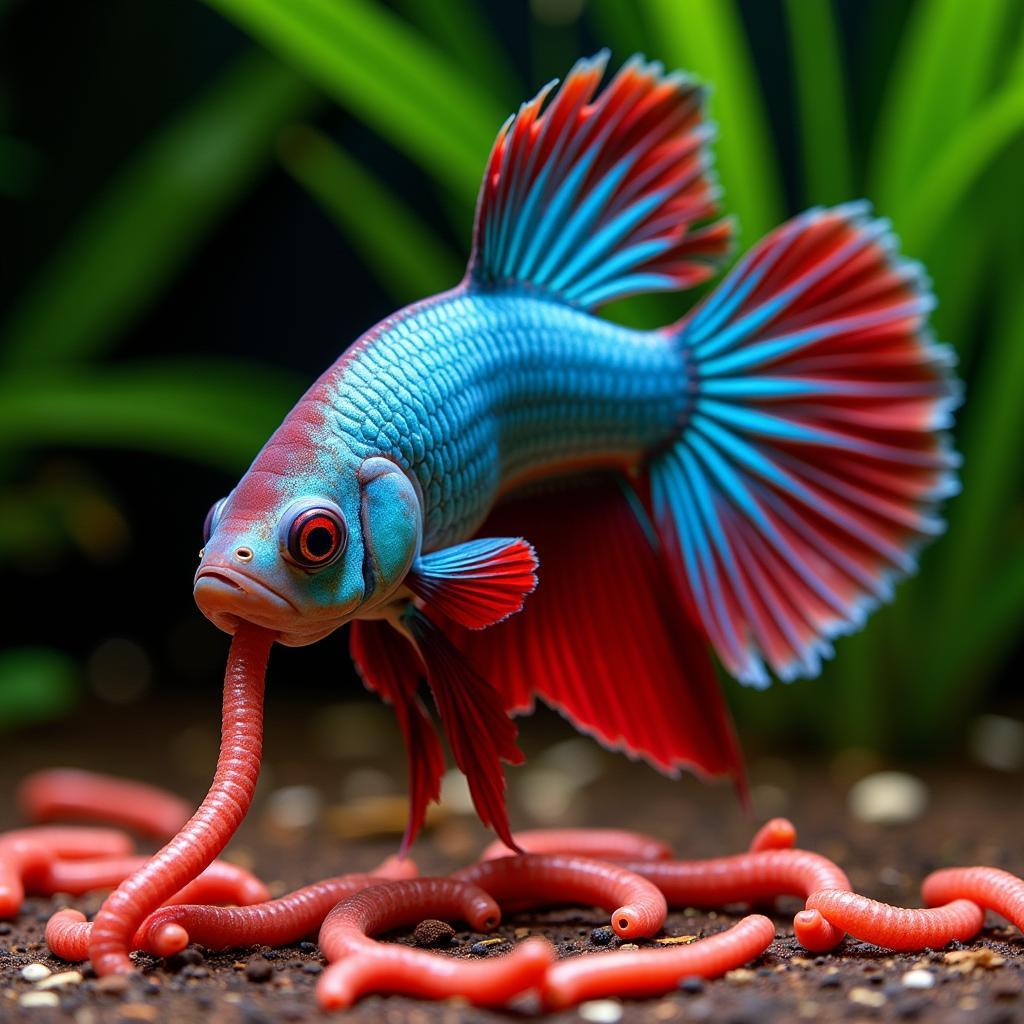Can You Feed A Betta Goldfish Food? It’s a question many new fish owners ponder. While it might seem convenient to use the same food for both types of fish, the reality is a bit more nuanced. Betta fish and goldfish have distinct dietary needs, and feeding them the wrong food can lead to health problems.
Feeding your betta fish goldfish food isn’t recommended. While your betta might nibble on it in a pinch, goldfish food lacks the crucial protein-rich ingredients a betta needs to thrive. Goldfish food is primarily plant-based, catering to their herbivorous diet. Bettas, on the other hand, are carnivores, requiring a diet high in protein and animal fats. A consistent diet of goldfish food can lead to malnutrition, a weakened immune system, and digestive issues in your betta. Instead, opt for high-quality betta pellets or flakes specifically formulated for their carnivorous needs.
The Nutritional Needs of Bettas vs. Goldfish
Understanding the differences in their nutritional needs is key to answering the question, “Can you feed a betta goldfish food?” Bettas thrive on a diet rich in insect-based protein. In their natural habitat, they primarily feed on insects and insect larvae. This high-protein diet fuels their active lifestyle and vibrant colors. Goldfish, conversely, graze on algae and plant matter. Their digestive system is designed to process plant-based foods, and their diet should reflect this. Giving a betta a primarily plant-based diet is like feeding a cat a diet of only vegetables.
Here’s a quick breakdown:
- Bettas: Carnivores, needing high protein and animal fats.
- Goldfish: Herbivores, requiring plant-based foods and algae.
 Betta fish eating bloodworms
Betta fish eating bloodworms
Choosing the right food is vital for the health of your aquatic pets. If you’re unsure, consider checking resources like can you feed a goldfish betta fish food.
What Happens If You Feed a Betta Goldfish Food?
So, what happens if you feed your betta goldfish food occasionally? While a single feeding likely won’t cause significant harm, continuous feeding of goldfish food can lead to several problems. These include:
- Malnutrition: Goldfish food lacks the essential nutrients a betta needs, leading to vitamin deficiencies and poor growth.
- Digestive Problems: A betta’s digestive system isn’t designed to process large amounts of plant matter, resulting in constipation and bloating.
- Weakened Immune System: Malnutrition weakens a betta’s immune system, making it more susceptible to diseases.
“Feeding your Betta a consistently inappropriate diet is like asking a marathon runner to perform on a diet of potato chips,” says Dr. Amelia Rivers, aquatic veterinarian. “They might get by for a short time, but their long-term health and performance will suffer significantly.”
Choosing the Right Betta Food
Feeding your betta a balanced diet is crucial for its health and longevity. Look for high-quality betta pellets or flakes that are specifically formulated for their carnivorous needs. These foods should list protein sources like fish meal, shrimp meal, or insect meal as the primary ingredients. Avoid foods with fillers like corn or wheat. Consult with an expert at your local pet store or research online for further information, perhaps even explore articles like can you feed betta fish goldfish food. Ensuring the proper nutrition for your betta is paramount.
What About Occasional Treats?
While a staple diet of betta-specific food is crucial, occasional treats can be a healthy addition. Bloodworms, brine shrimp, and daphnia are excellent sources of protein and can be offered as a supplement to their regular diet. Remember, moderation is key. Treats should only make up a small percentage of their overall diet.
Can Bettas and Goldfish Live Together?
While we’ve discussed their dietary differences, it’s important to note that bettas and goldfish are not ideal tank mates. Bettas are tropical fish, preferring warmer water temperatures, while goldfish thrive in cooler water. Their differing temperaments can also lead to conflict. Bettas are known for their territorial nature, and a goldfish’s slow movements can trigger aggression. If you’re looking to support a local food bank, consider resources like fish food pantry lockport.
“Mixing bettas and goldfish is like trying to pair a lion with a lamb,” explains Dr. David Chen, a renowned ichthyologist. “Their environmental needs and temperaments are simply too different for them to coexist peacefully.”
Conclusion: Stick to Betta-Specific Food
Can you feed a betta goldfish food? The short answer is no. While a single feeding might not be disastrous, a consistent diet of goldfish food will lead to malnutrition and health problems in your betta. Providing your betta with a diet specifically formulated for their carnivorous needs is essential for their overall well-being and vibrant life. By understanding their unique dietary requirements, you can ensure your betta thrives in its aquatic home.
FAQ:
- What is the best food for betta fish? High-quality betta pellets or flakes with protein sources like fish meal or insect meal.
- How often should I feed my betta? Once or twice a day, offering small amounts they can consume in a few minutes.
- Can I feed my betta live food? Yes, live foods like bloodworms and brine shrimp are excellent treats.
- What are the signs of a malnourished betta? Faded colors, lethargy, and a bloated or sunken belly.
- Can I feed my betta flakes meant for other tropical fish? While possible in a pinch, it’s best to stick to betta-specific food.
- What if my betta refuses to eat its food? Try a different brand or type of food, or consider offering live food.
- What other resources are there for fish food information? Websites like dr bassleer fish food can offer valuable insight into fish nutrition.
Need more assistance? Contact us 24/7 at Phone Number: 02437655121, Email: minacones@gmail.com Or visit us at: 3PGH+8R9, ĐT70A, thôn Trung, Bắc Từ Liêm, Hà Nội, Việt Nam. We have a dedicated customer support team ready to help.